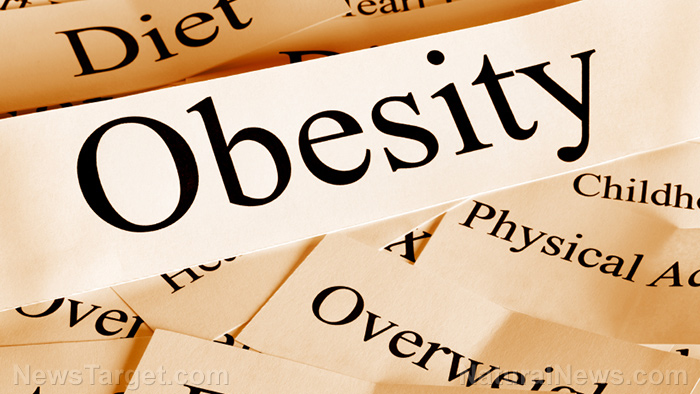This is why they just keep on getting fatter: Obesity dulls the taste, causing people to crave more sugar and salt
05/24/2018 / By Ralph Flores

Aside from an increased risk of metabolic and cardiovascular diseases, people who put on a lot of weight have another thing coming for them. Based on the results of a study conducted by Cornell University researchers, obesity can blunt a person’s taste buds, reducing their ability to enjoy the taste of food, especially for the five primary tastes: Salty, sweet, bitter, sour, and savory.
The study, which was published in PLOS Biology, discussed how chronic low-grade inflammation caused by obesity could reduce the number of taste buds on the tongue after examining murine gustatory tissues. “[This reduction in tissue] is likely the cause of taste dysfunction seen in obese populations—by upsetting this balance of renewal and cell death,” the researchers wrote.
To understand how the changes in the taste buds occur because of obesity, the team divided male mice into two groups. The control group was fed with a standard chow diet containing 14 percent fat; the experiment group, on the other hand, was provided with a high-fat diet that had a 58.4 percent fat content. After eight weeks, they observed that the high-fat diet group added about 30 percent to their body weight. In addition, the mice in this group had a taste-bud loss of around 25 percent more than those in the control group.
Reduction in taste buds is not uncommon: These cells are often renewed through a process that involves programmed cell death (apoptosis) and the production of new cells from “specialized progenitor cells.” What researchers discovered in the study, however, was that cell apoptosis increased in obese mice, which affected the number of progenitor cells that create new taste buds – explaining the reduction in the number of taste buds. In comparison, mice that were mutated to be resistant to obesity did not show these signs when they were subjected to the diet. This means that the adverse effects of obesity in the taste buds are not because of an increase in fat consumption but rather a build-up of fatty tissue.
The power of the elements: Discover Colloidal Silver Mouthwash with quality, natural ingredients like Sangre de Drago sap, black walnut hulls, menthol crystals and more. Zero artificial sweeteners, colors or alcohol. Learn more at the Health Ranger Store and help support this news site.
The results point to an underlying mechanism at work, that is, the need of obese people to eat more food to satisfy their cravings. This indicates that the taste buds, aside from sensing flavor and nutrients, can also trigger the brain’s reward system after eating “hedonically pleasing food,” researchers concluded. (Related: Obesity now a sign of POVERTY rather than wealth, 70-year-old study concludes… richer people tend to be slimmer.)
“This is a potential human mechanism for getting fat,” added Robin Dando, a professor of food science at Cornell University and the study’s senior author. He also noted that the results could pave the way for developing novel strategies to treat the disturbances in taste described in their study.
Other things that dull the taste
Aside from obesity, other factors may sabotage a person’s sense of taste.
- Smoking – Toxic chemicals in cigarettes adversely affect the taste buds, causing them to lose shape and become flat, dulling their sense of taste. In addition, a study from the University of Münster in Germany concluded that cigarette smoke also impairs a person’s sense of smell.
- Disorders that affect the sense of smell – Parkinson’s disease and other conditions that affect the nervous system can also affect a person’s sense of smell. This, in turn, affects his sense of taste as these two are closely linked. This is also true for nasal cavities problems or head injuries.
- Too much sugar – Regular consumption of sugary food and drink can short-circuit a person’s taste buds, preventing them from identifying full flavors. Moreover, sugar makes a person crave more sugar, which makes him prone to diabetes as well as obesity.
- Exposure to chemicals – Harsh chemical cleaners, which could be one of the most toxic things in a person’s household, can damage the sensory cells in the nose, in effect dulling both senses of taste and smell. A study conducted in Norway says that being exposed to harsh cleaning products has the same dangers as smoking 20 cigarettes a day.
- Excessive amounts of alcohol – While there’s nothing wrong with pairing good food with wine, there is something to be said when it’s overdone. According to a study published in the journal BMJ, heavy drinkers are at risk of impairing their sense of taste since alcohol numbs the taste buds.
Saving our sense of taste can start from a few changes in our lifestyle. To learn more about how to live a healthy life, head to NaturalMedicine.news today.
Sources include:
Tagged Under: apoptosis, cardiovascular disease, cell death, chronic low-grade inflammation, cravings, fat consumption, fatty tissue, food, food cravings, food science, hedonically pleasing food, high-fat diet, inflammation, metabolic disease, mind body science, obesity, primary tastes, research, sense of taste, slender, specialized progenitor cells, taste, taste bud loss, taste buds




















